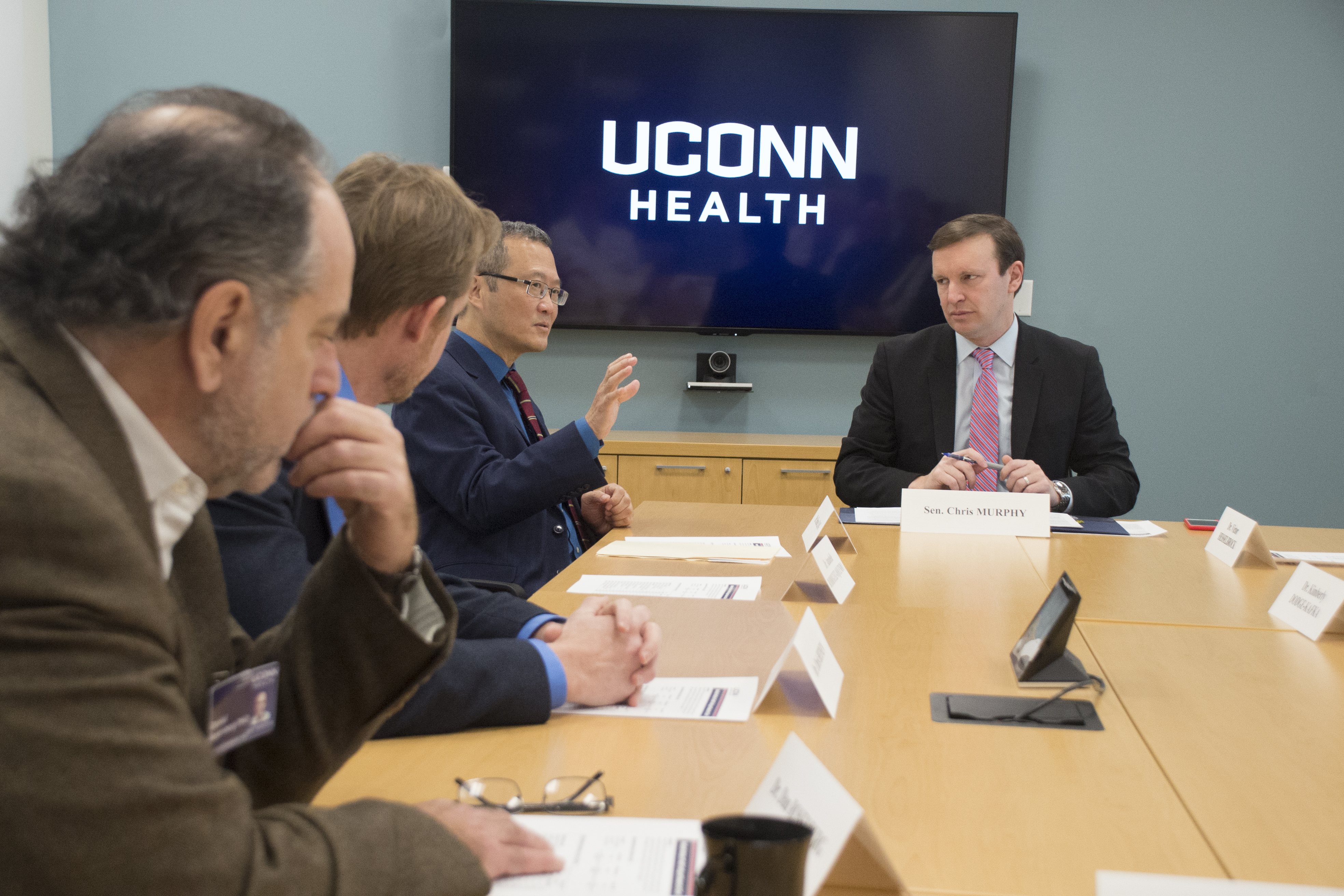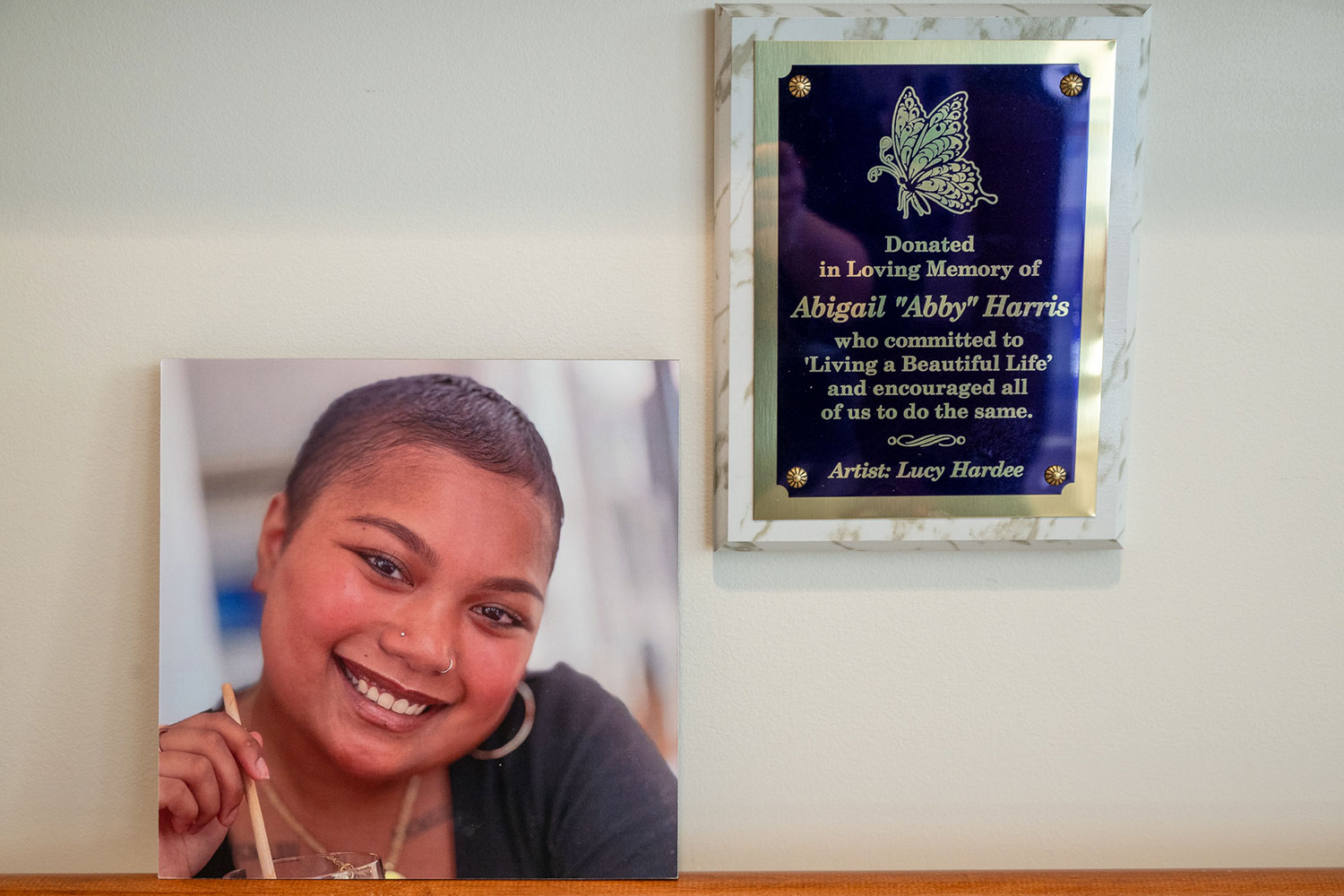Sen. Chris Murphy visited UConn Health on Feb. 2 for a roundtable discussion with researchers about Congress’s recent approval of a $2 billion increase to the National Institutes of Health budget, the biggest increase in 12 years.

Dr. Bruce Liang, dean of the UConn School of Medicine and director of the Pat and Jim Calhoun Cardiology Center, introduced Murphy as a longtime friend to UConn Health, going back to his work in the state legislature that helped establish the Connecticut Stem Cell Grant, a $100 million commitment to invest in stem cell research for 10 years, in 2005.
“At UConn Health, we are fortunate and competitive enough to last year attract $57 million in NIH funding,” Liang said. “The NIH funding allows us to support up to 1,000 employees here at UConn Health alone, along with the rest of the total grant funding, 5,000 employees through all of the University of Connecticut.”
Also, the discussion focused on President Obama’s “moonshot” proposal to spend nearly $1 billion over the next two years to better coordinate research efforts to fight cancer.
Dr. Pramod Srivastava, director of the Carole and Ray Neag Comprehensive Cancer Center, discussed his development and testing of a novel genomics-driven vaccine for preventing the recurrence of often deadly ovarian cancer. He also called on the NIH’s future funding to focus more on translational research, that is, the clinical application of laboratory findings.
“I want to be a big part of the president’s moonshot initiative,” Murphy said. “I want to make sure it’s supporting the work that we’re doing here. I want to make sure that it’s hitting the right places and at the same time I want to make sure it’s not crowding out other research that’s tremendously important to this state and this country.”

Murphy also heard support for basic science.
“The fundamental studies of mechanisms in our cells and molecules that we study have been instrumental in clinical advances that have been made in cancer, and in other diseases,” said Chris Heinen, a cancer researcher in the Center for Molecular Medicine.
Cell biology researcher Kimberly Dodge-Kafka, who studies heart disease, told Murphy, “I can give you hundreds of examples of how basic science has translated and changed clinical science.”
Dr. Annabelle Rodriguez-Oquendo, an endocrinologist whose research has uncovered gene variations associated with heart disease and infertility, also cautioned against focusing on just cancer at the expense of other areas of research.
“These genetic cholesterol disorders that link to disturbances in immune function are looking like they can also predict breast cancer risk in African American women,” Rodriguez said. “We can bridge quite a number of disciplines. I’d only ask that in this ‘moonshot’ for cancer that you can be an endocrinologist doing genetic research that can get you to cancer. You can’t be too narrow in scope.”
Victor Hesselbrock, senior associate dean for research coordination and planning, directs the UConn Alcohol Research Center, which is in its 39th consecutive year of NIH funding. He told Murphy a big focus of a national study of which he is co-principal investigator is on the epigenetic effects of substance abuse.
“We certainly would hope that Congress would see fit to focus a little bit more on other disorders, particularly behavioral-related disorders,” Hesselbrock said. “There are many paths into developing cancer, and certainly, chronic substance use, including alcohol, is heavily related to gastrointestinal cancers, it’s related to breast cancers, and a variety of other diseases.”
Toward the end of the meeting, Heinen suggested that because research has proven that cancer is an individualized disease, it should not always be discussed in the aggregate.

“It is extremely heterogeneous, and one person’s cancer is very different from someone else’s,” Heinen said. “So when President Obama says we want to cure cancer once and for all, you need to argue, we have cured cancer once and for all for some people. The challenge is, can we greatly expand the number of people for which we can say that? That’s the difficult challenge that we face.”
Murphy serves on both the Appropriations Committee and the Health Committee. Before adjourning, he opened the lines of communication between the researchers and his office for future discussions on the NIH budget allocations.
“We have made a big commitment here at UConn. Come to this campus and see the enormous capital investments that have been made,” Murphy said after the meeting. “The NIH is going to want to be a partner to what we’ve done. The reason the governor and the state legislature decided to start building here at UConn was because they were betting that there was going to be some more money coming from Washington. Well now there is, and so we can get a payback on the taxpayers’ investment here at UConn.”



